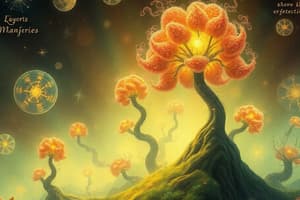Podcast
Questions and Answers
Which of the following is NOT a characteristic of living organisms?
Which of the following is NOT a characteristic of living organisms?
- Reproduction
- Growth
- Invisibility (correct)
- Breathing
Plants obtain energy through photosynthesis.
Plants obtain energy through photosynthesis.
True (A)
What is the primary function of the respiratory system?
What is the primary function of the respiratory system?
To facilitate gas exchange.
The _____ is the basic unit of life.
The _____ is the basic unit of life.
Match the following systems with their functions:
Match the following systems with their functions:
Flashcards are hidden until you start studying
Study Notes
Characteristics of Living Organisms
- Living organisms exhibit a range of characteristics that distinguish them from non-living matter.
- These characteristics include: organization, metabolism, growth and development, responsiveness, adaptation, reproduction, and homeostasis.
Photosynthesis
- Plants are autotrophs, meaning they can produce their own food through the process of photosynthesis.
- Photosynthesis uses sunlight, carbon dioxide, and water to create glucose (a type of sugar) and oxygen.
Respiratory System
- The respiratory system is responsible for the intake of oxygen and the release of carbon dioxide.
- This exchange of gases is essential for cellular respiration, where energy is extracted from glucose.
Basic Unit of Life
- The cell is the basic unit of life.
- All living organisms are composed of one or more cells.
Systems and Functions
- The digestive system breaks down food into smaller molecules that can be absorbed by the body.
- The circulatory system transports blood, oxygen, nutrients, and waste products throughout the body.
- The nervous system receives sensory information from the environment and coordinates responses.
- The muscular system allows for movement and provides support.
- The skeletal system provides support, protection, and allows for movement.
- The endocrine system produces hormones that regulate various bodily functions.
- The immune system protects the body from disease-causing organisms.
- The excretory system removes waste products from the body.
- The integumentary system provides protection, regulates temperature, and receives sensory information.
- The reproductive system is responsible for sexual reproduction.
Studying That Suits You
Use AI to generate personalized quizzes and flashcards to suit your learning preferences.




